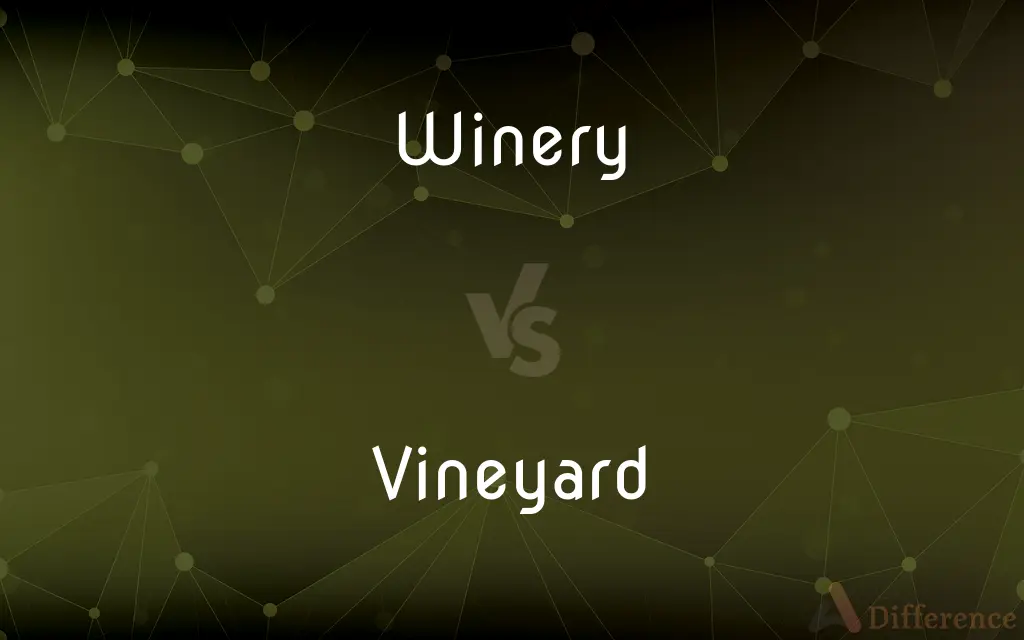Winery vs. Vineyard — What's the Difference?
By Tayyaba Rehman & Maham Liaqat — Updated on March 25, 2024
A winery is a facility for making wine, while a vineyard is where grapes are grown.

Difference Between Winery and Vineyard
Table of Contents
ADVERTISEMENT
Key Differences
A winery is a licensed establishment where grapes are processed into wine, involving fermentation and bottling operations. Whereas a vineyard is an agricultural plantation specifically dedicated to growing grapevines for winemaking, focusing on the cultivation aspect.
Wineries may be located on the same premises as vineyards but are distinct in their function, with the primary emphasis on production techniques and wine creation. On the other hand, vineyards concentrate on agricultural practices, soil management, and the growth cycle of grapevines to produce quality grapes.
The role of a winery extends beyond fermentation to include aging, blending, and packaging of wine, showcasing the technological and artistic aspects of winemaking. Vineyards, however, play a crucial role in determining the character and quality of wine, with factors such as climate, terroir, and vine health being paramount.
Wineries often feature tasting rooms and tours, providing an educational and sensory experience for visitors, highlighting the end product of the winemaking process. Vineyards might offer tours focusing on viticulture, giving insight into grape-growing practices and the significance of terroir.
While a winery's success is measured by the quality, innovation, and market reception of its wines, a vineyard's success hinges on the health, yield, and quality of its grape harvest, reflecting the interdependence of these two entities in the winemaking industry.
ADVERTISEMENT
Comparison Chart
Function
Processes grapes into wine.
Grows grapes for wine.
Focus
Wine production techniques and operations.
Agricultural practices and cultivation of grapevines.
Location
Can be separate from or located within a vineyard.
Specifically designated areas for growing grapes.
Activities
Fermentation, aging, blending, and packaging.
Soil management, planting, and harvesting.
Visitor Experience
Offers tastings and tours of production facilities.
May offer tours focusing on viticulture and terroir.
Compare with Definitions
Winery
Often includes amenities like tasting rooms and event spaces.
The winery offers guided tours and wine tasting sessions.
Vineyard
May offer tours to showcase the grape-growing process and terroir.
The vineyard tour includes a walk through the grapevines and a discussion on viticulture.
Winery
A facility where wine is made, including processes like fermentation and bottling.
The winery produces several award-winning wines each year.
Vineyard
Focuses on the cultivation and harvest of quality wine grapes.
Our vineyard employs organic farming practices.
Winery
An establishment involved in the entire winemaking process.
Our winery has a state-of-the-art fermentation system.
Vineyard
Can be associated with a single winery or supply multiple wineries.
This vineyard supplies grapes to several premium wineries in the region.
Winery
May source grapes from its own vineyard or from other growers.
The winery sources grapes from over thirty local vineyards.
Vineyard
A plantation of grapevines, primarily for winemaking purposes.
The vineyard covers fifty acres of rolling hills.
Winery
A place where wine is aged, blended, and prepared for distribution.
The winery's cellars are home to thousands of barrels of aging wine.
Vineyard
Influenced by factors like climate, soil type, and vine management.
The vineyard's unique terroir contributes to the distinct flavor of the grapes.
Winery
A winery is a building or property that produces wine, or a business involved in the production of wine, such as a wine company. Some wine companies own many wineries.
Vineyard
A vineyard ( VIN-yərd; also UK: VIN-yard) is a plantation of grape-bearing vines, grown mainly for winemaking, but also raisins, table grapes and non-alcoholic grape juice. The science, practice and study of vineyard production is known as viticulture.
Winery
An establishment at which wine is made.
Vineyard
A tract of land where grapes are grown.
Winery
A place where wine is made, or a company that makes wine.
Vineyard
A sphere of endeavor
Toiled in the vineyard of publishing.
Winery
A place where grapes are converted into wine.
Vineyard
A grape plantation, especially one used in the production of wine.
The vineyard of Château Margaux stands as the producer of one of the world's greatest and most sought-after red wines.
Winery
Distillery where wine is made
Vineyard
An inclosure or yard for grapevines; a plantation of vines producing grapes.
Vineyard
A farm of grapevines where wine grapes are produced
Common Curiosities
Can a winery operate without owning a vineyard?
Yes, wineries can source grapes from external vineyards instead of owning one.
Are vineyard tours focused on wine tasting?
Vineyard tours are more focused on viticulture and the grape-growing process, though they may include wine tasting.
What influences the quality of wine from a vineyard?
Factors like climate, soil type, vine management, and terroir significantly influence wine quality.
What are tasting rooms in wineries for?
Tasting rooms allow visitors to sample wines, learn about the winemaking process, and purchase wines directly.
Do all wineries use grapes from their own vineyards?
Not all; some wineries source grapes from other vineyards to diversify their wine profiles or meet production needs.
What's the significance of a winery's location in relation to a vineyard?
The location can affect logistics and the freshness of grapes, but many wineries prioritize specific vineyard characteristics over proximity.
How does terroir affect a vineyard?
Terroir affects the taste and quality of the grapes through climate, soil, and geographical factors.
What is the main difference between a winery and a vineyard?
The main difference is their function: a winery is where wine is made, while a vineyard is where grapes are grown.
Why might a winery choose to source grapes from different vineyards?
To achieve complexity and depth in their wines, or to produce a wider variety of wine styles.
Can the same grape variety produce different wines from different vineyards?
Yes, due to variations in terroir and vineyard management practices, the same grape variety can yield wines with different profiles.
How do climate and soil contribute to a vineyard's success?
Climate determines the growing season length and affects grape maturity, while soil influences the water and nutrient availability, impacting grape quality.
What is the role of a winemaker?
A winemaker oversees the winemaking process, from grape selection to fermentation, aging, and bottling, ensuring the quality of the wine.
What are the benefits of visiting a vineyard and a winery?
Visitors can gain insight into the entire winemaking process, from grape cultivation to wine production, enhancing their appreciation of wine.
Can a winery be considered sustainable?
Yes, if it employs practices that minimize environmental impact, such as water conservation, recycling, and sustainable farming.
How does the concept of terroir extend beyond vineyards to wineries?
While terroir is primarily associated with vineyards, wineries can also influence the expression of terroir through their winemaking techniques and philosophy.
Share Your Discovery

Previous Comparison
Yourself vs. Thyself
Next Comparison
Gherkin vs. WallyAuthor Spotlight
Written by
Tayyaba RehmanTayyaba Rehman is a distinguished writer, currently serving as a primary contributor to askdifference.com. As a researcher in semantics and etymology, Tayyaba's passion for the complexity of languages and their distinctions has found a perfect home on the platform. Tayyaba delves into the intricacies of language, distinguishing between commonly confused words and phrases, thereby providing clarity for readers worldwide.
Co-written by
Maham Liaqat













































